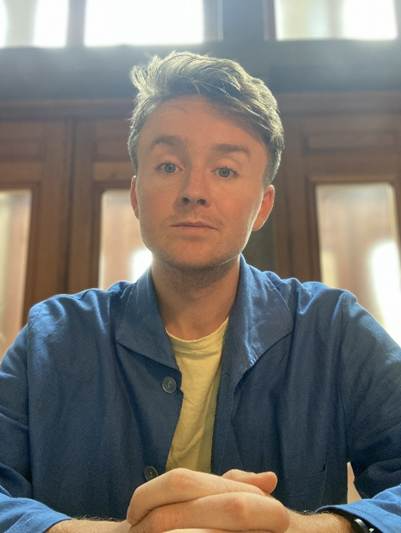
Monday, 20. 10. 2025 at 9:40 a.m., Lecture Hall 434, Faculty of Arts, University of Ljubljana (Aškerčeva 2, Ljubljana):
“Free Experimental Thought: Nietzsche and the Modernisation of Mathematics”
Mathematics, with its ostensible origins in the lines drawn in the sand by the Ancient Greeks, is still often viewed as a culturally neutral enterprise whose influences and forms of knowledge are irreconcilable with those of literature and art. It is this disciplinary line in the sand that I seek to destabilise with this lecture on the versatile modern mathematician, Felix Hausdorff, and his influences from a philosophical heavyweight who seems to bear little relevance to mathematical thought but whose influence on cultural modernism was perhaps unrivalled: Friedrich Nietzsche. In 1903, Hausdorff gave his inaugural lecture as a professor of mathematics at Leipzig University on the “das Raumproblem” (the problem of space), an event that set him up to become a decisive actor in the modernisation of mathematics in the 1910s and 20s. Immediately prior to this, however, Hausdorff enjoyed a brief period of philosophical and creative engagement under a pseudonym Paul Mongré, releasing two philosophical volumes, a swathe of critical essays and even a successful stage play. In this lecture, I argue that Hausdorff’s ideas as a modern mathematician can be traced back through the Mongré period to a direct engagement with Nietzschean philosophy. Specifically, I argue that Hausdorff’s conceptualisation of mathematics in the modern era as “free experimental thought” is bound to his reception of Nietzsche’s doctrine of Eternal Return and the critique of language and ontology in On Truth and Lies in a Nonmoral Sense. By tethering Nietzsche’s explicitly non-mathematical ideas to the field’s modernisation in the early 20th Century, I thus excavate a small, local but nonetheless important moment of cross-disciplinary influence. Ultimately, it is hoped, the enduring perceptions that keep mathematics and the humanities at a distance from one another are put on less solid footing.
Thursday, 23. 10. 2025 at 3:30 p.m., Blue Room (conference room), Faculty of Arts, University of Ljubljana (Aškerčeva 2, Ljubljana):
“The Poetry of (Anti-)Logical Ideas: Modern Mathematics and the German Avant-Garde”
In the 1920s and early 1930s, the trailblazing Göttingen mathematician Emmy Noether (1882-1935) became known among her colleagues for a strident belief that mathematicians are in fact artists, not scientists. To what extent, therefore, can modern mathematics, be considered alongside contemporaneous literary and cultural modernisms? In answer to this question, this lecture seeks to better embed modern mathematical thought and methods within a wider modernist collective, considering rather different waves of the German and European Avant-Garde in the process. Firstly, I seek to disrupt the more plausible discussion of the Bauhaus school as “modernist” in a sense that parallels mathematical modernism. Though replete with geometrical and constructive concepts, Bauhaus espouses the very philosophies of space, cognition and objectivity from which mathematics broke away in the early 20th Century: Platonism and Kant’s transcendental aesthetic. In turn, I identify a more fitting counterpart for mathematical modernism in the least likely of places: the disorderly and purportedly illogical Dadaism. For all their apparent differences, I argue that both modern mathematics and Dadaism adhere to a formal procedure — a way of thinking and working — that fundamentally reimagines logic, abstraction and criteria of meaning. In the end, Noether’s brand of mathematics, called “the poetry of logical ideas” by Albert Einstein, finds unexpected operational parity in Dada’s “Antilogik,” spanning sound poetry, readymades and assemblages.
Short Bio
Tom Hedley (he/him) is a visiting research fellow at the University of Ljubljana and currently a FNRS Postdoctoral Researcher based at the Université libre de Bruxelles (ULB), where he lectures on German-language literature and culture. A graduate of German and mathematics from Trinity College Dublin (2017), I completed an MA in Literature, Art and Culture at the Friedrich-Schiller-Universität Jena in Germany with the support of a DAAD scholarship (2019). He defended his PhD on German modernism and mathematics at Trinity College Dublin, which was fully funded by the Irish Research Council, in December 2023. Between his PhD and current postdoctoral role, he was a lecturer in comparative literature at Utrecht University. On top of 20 conference presentations in nine countries to date, he has published his research (in both English and German) in journals such as Germanistik in Ireland (2021), Imaginaires (2021), Open Library of Humanities (2025), Germanistische Mitteilungen (forthcoming 2025) and Modern Language Review (forthcoming 2026).
